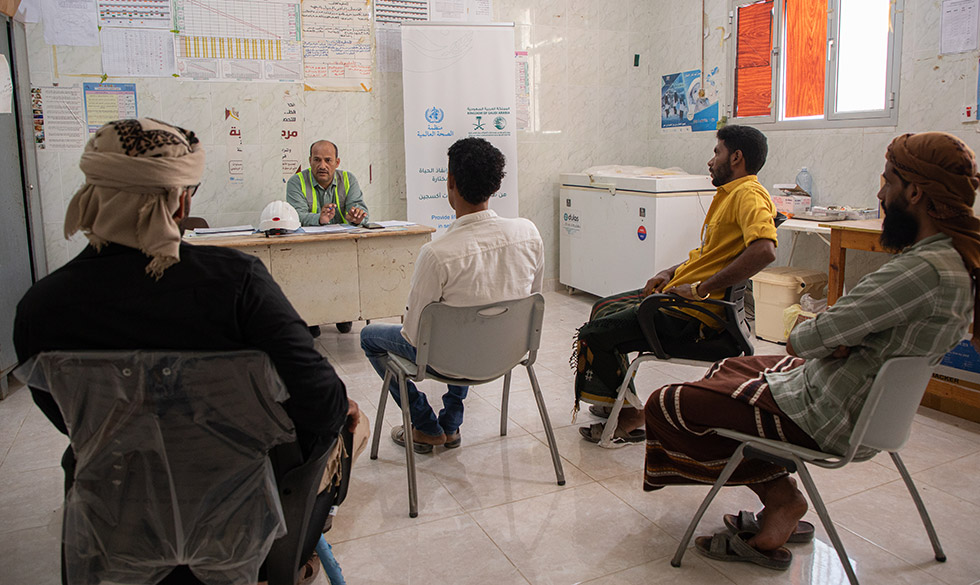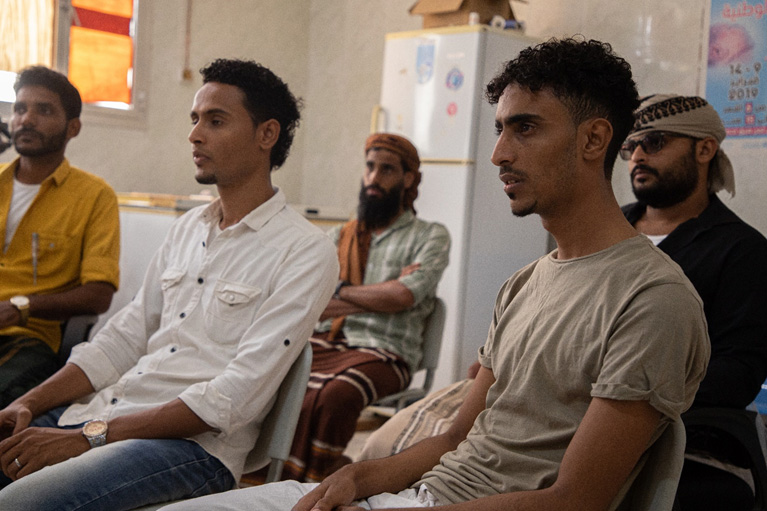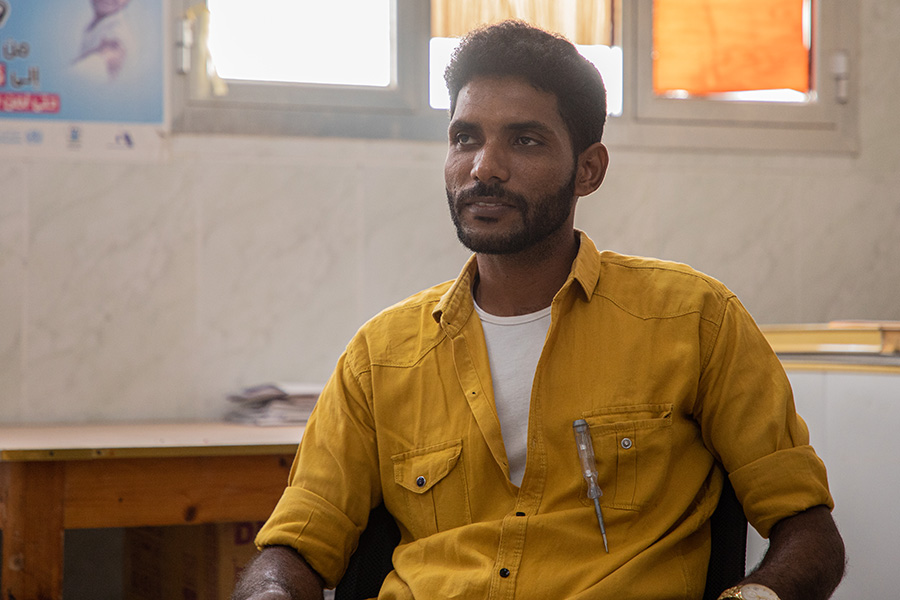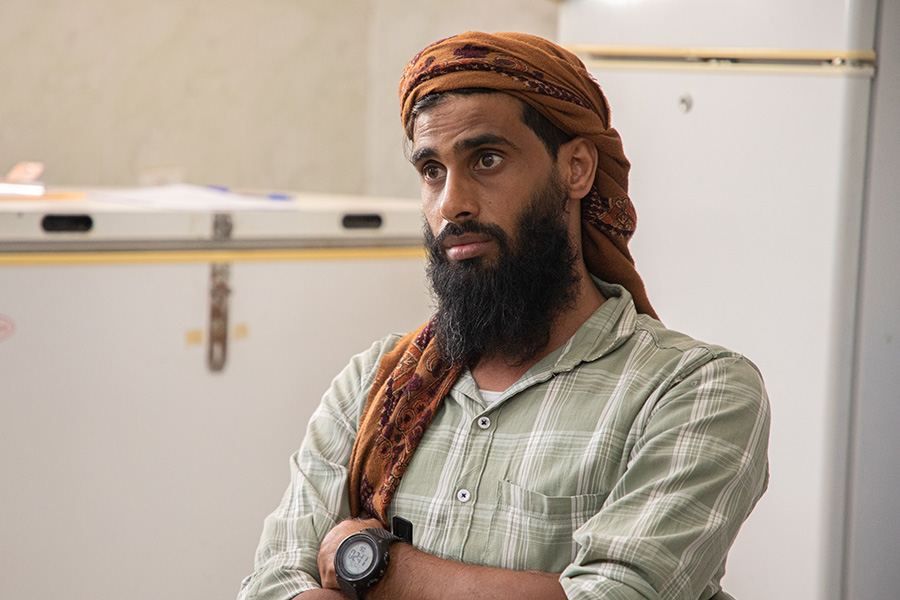 Training under way in Tarim district, Hadhramaut governorate. Photo credit: WHO
Training under way in Tarim district, Hadhramaut governorate. Photo credit: WHO
29 January 2024 – With funding received from King Salman Humanitarian Aid and Relief Centre (KSrelief), WHO has set up 5 life-saving oxygen stations in hospitals across 5 key governorates in Yemen. This impactful project has involved a series of crucial activities, including provision of electric generators, construction of structure for oxygen station equipment, procurement and installation of oxygen plants, implementation of an oxygen network piping system to distribute medical oxygen to the wards in each hospital, and training of 21 skilled technical workers.
 Contractor Mr Hashim Aidroos (front row, right) in the training session. Photo credit: WHOMinistry of Public Health and Population engineers thoroughly inspected the oxygen stations before they were officially handed over to the hospitals. The oxygen stations are now playing a vital role in supplying medical oxygen to the hospitals, ensuring a lifeline for those in critical need. An integral part of the project was the 3-day training provided to the technical workers from the 5 hospitals. This on-the-job training ensures the efficient functioning and delivery of oxygen services at these crucial health facilities.
Contractor Mr Hashim Aidroos (front row, right) in the training session. Photo credit: WHOMinistry of Public Health and Population engineers thoroughly inspected the oxygen stations before they were officially handed over to the hospitals. The oxygen stations are now playing a vital role in supplying medical oxygen to the hospitals, ensuring a lifeline for those in critical need. An integral part of the project was the 3-day training provided to the technical workers from the 5 hospitals. This on-the-job training ensures the efficient functioning and delivery of oxygen services at these crucial health facilities.
 Maintenance technician Mr Ahmed Ali during the training session. Photo credit: WHO“The training session on the oxygen station today was incredibly insightful,” said contractor Mr Hashim Aidroos. “I gained a comprehensive understanding of the oxygen’s source, its various types and its crucial role in sustaining both humanity and hospitals. Recognizing its significance for patients, I personally believe we need more of these stations to alleviate overcrowding and enhance health care services.”
Maintenance technician Mr Ahmed Ali during the training session. Photo credit: WHO“The training session on the oxygen station today was incredibly insightful,” said contractor Mr Hashim Aidroos. “I gained a comprehensive understanding of the oxygen’s source, its various types and its crucial role in sustaining both humanity and hospitals. Recognizing its significance for patients, I personally believe we need more of these stations to alleviate overcrowding and enhance health care services.”
“This station saves time and costs, being here in Qishn,” he added. “We, as contractors, are committed to fortifying its operations, fostering collaboration and ensuring its continued success. From our experience and discussions with people we know, the impact has been tangible.”
Added another trainee, Mr Ahmed Ali, a maintenance technician: “We learned the sophisticated process of extracting oxygen from nature, mastering the techniques of filtration and purification to fill cylinders with pure oxygen. This visionary project is designed to cater not only to our district, but I personally see it as a great step to the whole of Yemen.”
“The joy is immeasurable when witnessing a patient’s recovery,” he went on to say. “As the oxygen station commenced its operations, a moment of divine satisfaction embraced us, marking balance and independence from external oxygen sources.”
 Mr Abdullah Khalid Shallal, a dentist, also found the training very useful: “The training was valuable for us, equipping us with essential skills in operating machines, filling cylinders, and exercising caution due to the presence of flammable materials. Before the establishment of the oxygen station, obtaining oxygen was a constant struggle, relying on donated cylinders. Now, with the station in operation, we are not only self-sufficient but can also provide oxygen to others.”
Mr Abdullah Khalid Shallal, a dentist, also found the training very useful: “The training was valuable for us, equipping us with essential skills in operating machines, filling cylinders, and exercising caution due to the presence of flammable materials. Before the establishment of the oxygen station, obtaining oxygen was a constant struggle, relying on donated cylinders. Now, with the station in operation, we are not only self-sufficient but can also provide oxygen to others.”
“Grateful for the oxygen station, we aspire to extend these services throughout Yemen, fostering the development and enhancement of the country’s health department,” he continued.
“Witnessing a patient’s recovery and improvement is an indescribable joy. The arrival of the oxygen station is a blessing,” said Mr Shallal. “We hope for its expansion, offering more stations, services and additional health care departments. This, we believe, will contribute to the overall advancement of the health sector.”








